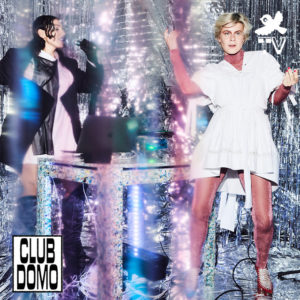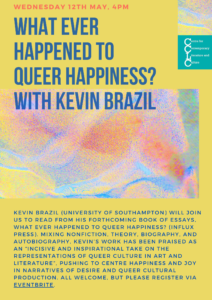The Centre for Contemporary Literature and Culture was excited to welcome writer, critic and Associate Professor of English Literature at the University of Southampton, Kevin Brazil, to read from his book of essays, What Ever Happened to Queer Happiness?, which is forthcoming from Influx Press in 2022. What Ever Happened to Queer Happiness? will be eight essays, with each essay cycling through various forms of culture to turn through what queer happiness means. Brazil said during the event that the book is guided by figures and people rather than theory, and that some of the essays will touch upon Derek Jarman, Catherine Opie, Félix González-Torres, among others.
 The event began with a reading from the last essay in What Ever Happened to Queer Happiness? and concerned the new pandemic-necessitated art of the online club night. Brazil called it “the most joyful” essay in the book, one which explores the manifestation of happiness, queer or otherwise. To set the scene of the piece: it’s April 2020, and the Swedish pop singer and songwriter Robyn is taking centre screen and keeping in touch with her fans during the pandemic through a series of livestreamed eclectic DJ sets at ‘Club DOMO’, showcasing house music, techno, disco, funk, soul, new age, and beyond. Brazil structured his essay through Robyn’s Club DOMO Volume 1 tracklist and the intimate sphere of the livestream: he ran through the likes of Jamie xx’s ‘Idontknow’, ‘Hyper Seconds’ by Lone, ‘Always’ by Erasure, and Choker’s ‘Gradient’. The essay oscillated between the personal, individual experience of dancing on one’s own in one’s home, and then zoomed out to the fantasy of dancing with your friends and Robyn herself in a nightclub. There was a nostalgia in hearing Brazil discuss the early pandemic online club night and the uncertainty of the time seeping away in our endless attempts to recreate pre-pandemic life through virtual platforms. In April last year, we came together through the pixilations on our screens, and not the cafés, pubs, or dancefloors that we used to frequent. We clung to our laptops as if they were the only open window into our past lives. In a way, they were. Brazil called this nostalgia “a kind of death” which denies the idea that anything new can happen to us. Living in the past and the wildly fantasised “pre” – pre-pandemic, pre-lockdown, pre-masks, pre-this – Brazil’s reading from What Ever Happened to Queer Happiness? touched on the possibilities of joy and connection in painful and otherwise isolated moments.
The event began with a reading from the last essay in What Ever Happened to Queer Happiness? and concerned the new pandemic-necessitated art of the online club night. Brazil called it “the most joyful” essay in the book, one which explores the manifestation of happiness, queer or otherwise. To set the scene of the piece: it’s April 2020, and the Swedish pop singer and songwriter Robyn is taking centre screen and keeping in touch with her fans during the pandemic through a series of livestreamed eclectic DJ sets at ‘Club DOMO’, showcasing house music, techno, disco, funk, soul, new age, and beyond. Brazil structured his essay through Robyn’s Club DOMO Volume 1 tracklist and the intimate sphere of the livestream: he ran through the likes of Jamie xx’s ‘Idontknow’, ‘Hyper Seconds’ by Lone, ‘Always’ by Erasure, and Choker’s ‘Gradient’. The essay oscillated between the personal, individual experience of dancing on one’s own in one’s home, and then zoomed out to the fantasy of dancing with your friends and Robyn herself in a nightclub. There was a nostalgia in hearing Brazil discuss the early pandemic online club night and the uncertainty of the time seeping away in our endless attempts to recreate pre-pandemic life through virtual platforms. In April last year, we came together through the pixilations on our screens, and not the cafés, pubs, or dancefloors that we used to frequent. We clung to our laptops as if they were the only open window into our past lives. In a way, they were. Brazil called this nostalgia “a kind of death” which denies the idea that anything new can happen to us. Living in the past and the wildly fantasised “pre” – pre-pandemic, pre-lockdown, pre-masks, pre-this – Brazil’s reading from What Ever Happened to Queer Happiness? touched on the possibilities of joy and connection in painful and otherwise isolated moments.
 Brazil ran through a whistle-stop tour of the history of house, techno and dance music, underscoring their Black origins and Black omission in the contemporary European imaginary of club culture. We heard snippets of folklore about Larry Levan, Frankie Knuckles, and the “music which raises its origins to myth.” We journeyed with Brazil through his memories of clubbing where “the greatest nights were those in the past.” These memories become stories that we tell ourselves, and Brazil’s narration sparked images of our own remembrance of the nights out that we now mythologise. Brazil anaphoric utterances “It feels like” emphasised the importance of affect and emotion in the art of clubbing, something called upon by the dance music pounding, surrounded by friends, anonymous in a crowd, where, as Brazil put it so beautifully, “your heartbeat becomes the world.”
Brazil ran through a whistle-stop tour of the history of house, techno and dance music, underscoring their Black origins and Black omission in the contemporary European imaginary of club culture. We heard snippets of folklore about Larry Levan, Frankie Knuckles, and the “music which raises its origins to myth.” We journeyed with Brazil through his memories of clubbing where “the greatest nights were those in the past.” These memories become stories that we tell ourselves, and Brazil’s narration sparked images of our own remembrance of the nights out that we now mythologise. Brazil anaphoric utterances “It feels like” emphasised the importance of affect and emotion in the art of clubbing, something called upon by the dance music pounding, surrounded by friends, anonymous in a crowd, where, as Brazil put it so beautifully, “your heartbeat becomes the world.”

The crescendo of Brazil’s reading came from the crescendo of those last songs which echo through dancefloors across the world. Those special, one-use-only anthems often by the likes of Ultravox, Bronski Beat and Alison Moyet, whose value, Brazil said, comes from their rarity; the overperformance of such songs work perfectly at the end of a night to bring the crowd together, becoming, “for one long messy song, friends.”
Brazil’s reading on the art of the online club night paced through stories framed by songs, dripping in nostalgia for a time before. That Robyn’s Club DOMO and the livestreamed set can arouse these emotions speaks to the mastery of the DJ’s selection, but also to Brazil’s writing. Our position at the CCLC event watching Brazil talk about digital experiences of past physical events while watching him talk through our own computer screens created a doubly pertinent feeling of both distance and digital connection. The event felt like Brazil was holding our hand in the club, weaving us through the crowd, pausing now and then to listen to the music, bringing us together in the dark.

